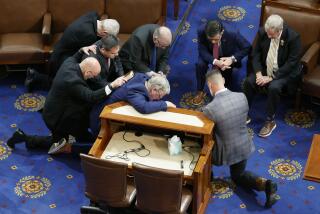Blair’s faith-based debut
LONDON — A cathedral is an odd place for a coming-out party.
But not, as it turns out, if you’re a former prime minister of Britain and you’re preparing to tell the world that God was one of your senior advisors during your 10 years in power.
Speaking one recent evening under the lofty Byzantine vaults of Westminster Cathedral, Tony Blair ended his self-imposed silence on the subject, declaring that his faith has formed the essential backdrop to much of his political life.
Blair had begun to pick at the subject haltingly over the last year, announcing his conversion to Catholicism (after years of secretly attending Mass as prime minister) in December. But only now is he discussing it fully and openly, and acknowledging the degree to which his religious faith informed his years leading America’s closest ally.
“Today, precisely because all the fixed points of reference seem unfixed and constantly in flux, today is more than ever when we need to discover and rediscover our essential humility before God,” Blair told an audience of 1,600 invited guests at the chief Roman Catholic cathedral in England and Wales.
“I can’t prove that religious faith offers something more than humanism,” he said. “But I believe profoundly that it does.”
In the United States, where talk of God and church can sometimes seem a prerequisite to getting elected, these open expressions of belief would not be unusual; in secular Europe, where religiosity tends to be viewed with suspicion, Blair said he kept his belief long under wraps for fear of being dismissed as “a nutter.”
“One of the oddest questions I get asked in interviews, and I get asked a lot of questions, is: Is faith important to your politics? It’s like asking someone whether their health is important to them or their family. If you are someone ‘of faith,’ it is the focal point of belief in your life. There is no conceivable way that it wouldn’t affect your politics,” Blair said.
“But there is a reason why my former press secretary Alastair Campbell once famously said, ‘We don’t do God.’ In our culture, here in Britain and in many other parts of Europe, to admit to having faith leads to a whole series of suppositions, none of which are very helpful to the practicing politician.”
Blair’s aides have long said that his policies on intervention in Iraq, Kosovo and Sierra Leone were motivated not by practicalities or even, in the case of the 2003 invasion of Iraq, fear of weapons of mass destruction so much as a profound sense that they were the “right” thing to do.
Yet it has become clear over the last year or so that religion permeated many aspects of Blair’s work in government. Last year, Blair told ITV1 that he had prayed while making his decision on committing British forces to Iraq.
“In the end, there is a judgment that, I think if you have faith about these things, you realize that judgment is made by other people . . . and if you believe in God, it’s made by God as well,” he said.
That Blair’s coming-out would not be easy goes without saying, and perhaps accounts for his reticence during his years at Downing Street to discuss the issue.
Britain has a long history of tension between Roman Catholics and Protestants; the Church of England, which is Protestant, has status as an official church, with its bishops sitting in the House of Lords, and the heir to the British throne is not permitted to marry a Catholic. Though relatively little of the friction remains today, the nation has never had a Catholic prime minister.
Longtime liberal commentator Rod Liddle took Blair to task for in essence invoking God on the sly. “In other words, Tony believed in God but not with sufficient conviction or fervor to allow the voters to know he believed in God,” he wrote in the Sunday Times.
“The creator of the universe was an embarrassing encumbrance whom the prime minister was forced to take around with him, perhaps in his back pocket. . . . He would be retrieved from the pocket only once in a while, to offer a quiet but enthusiastic endorsement of some policy Tony was about to embark upon, and then be put back, very quietly, while nobody was looking.”
Blair also has taken heat from antiabortion groups and some among Britain’s 6 million Catholics, who complain that his record in support of abortion rights, homosexual civil unions, stem cell research and measures that might hasten the death of terminally ill patients belie the official teachings of the Roman Catholic Church.
John Smeaton, head of the Society for the Protection of Unborn Children, wants Blair to repudiate some of those positions.
“Whether he says it or not, the fact of the matter is that defending the inviolable dignity of every human life is the fundamental teaching of the Catholic Church,” Smeaton said. “It would be rather like saying, ‘Yes, indeed, St. Paul has converted to Christianity, but he absolutely refuses to repudiate the killing of Christians. He doesn’t want to go into it.”
Blair’s religion is based as much on conviction about right and wrong as on specific doctrines, say many of those who know him.
“This is a man who, in terms of judgment of right and wrong, would think that his own judgment was at least as good as that of the archbishop of Canterbury, the cardinal of Westminster and the pope combined,” a former Blair aide is cited as saying in “Blair Unbound” by biographer Anthony Seldon.
In his Westminster speech, Blair said his foundation would “help partner those within any of the faiths who stand up for peaceful coexistence and reject the extremist and divisive notion that faiths are in fundamental struggle against each other.”
He will also explore the interaction of faiths around the world for good and ill in a course he has agreed to teach next year at Yale University on faith and globalization.
“Faith,” Blair said, “answers to the basic, irrepressible, irresistible human wish for spiritual betterment, to do good, to think and act beyond the limitations of selfish human desires.
“Faith is not something separate from our reason, still less from society around us, but integral to it, giving the use of reason a purpose and society a soul, and human beings a sense of the divine,” he said.
“This is the life purpose that cannot be found in constitutions, speeches, stirring art or rhetoric. It is a purpose uniquely centered around kneeling before God.”
--
More to Read
Sign up for Essential California
The most important California stories and recommendations in your inbox every morning.
You may occasionally receive promotional content from the Los Angeles Times.










